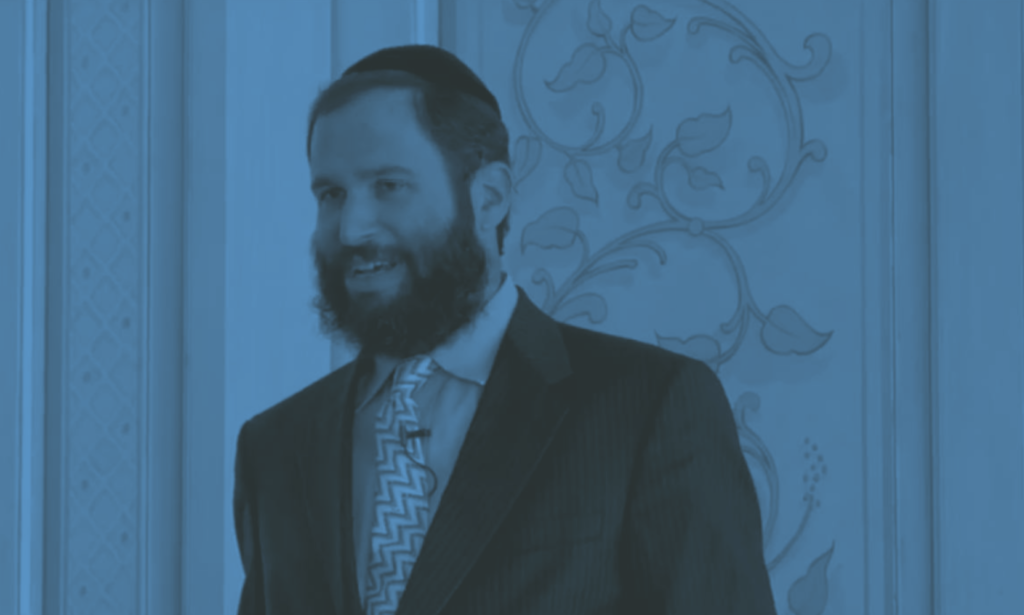Anger in America; Children Are Listening

Part Three of Contributing Editor Bob Jones' conversation with Rabbi Moshe Scheiner of the Palm Beach Synagogue in Florida.
In this third part of our conversation, Rabbi Moshe Scheiner reflects on raising children in a time of fearful expressions of anti-Semitism, armed security at places of worship, joy and the image of God
Bob Jones: You're the father of six children?

Rabbi Scheiner: Yeah.
Bob Jones: How have you prepared your own kids to meet the anger, fear and hatred of anti-Semitism?
Rabbi Scheiner: I've raised my kids to be very proud Jews. The first thing is obviously never cower in the face of anti-Semitism. My children, like myself, walk around with a yarmulke on their head. We never try to camouflage or to fit in. We believe in the dignity of different. And we should respect every religion, every good creed, race, religion. Because like I said, we could all learn from each other.
Every religion, every culture, every society has wonderful positive things and we all need each other. And so my children are ambassadors of Judaism in this world. That's what God gave them as their role and they should wear that proudly. Their faith in God should not be invisible. It should be visible not just in their physical appearance, but in their speech, in their thought, in their deeds and that's what we do.

There has to be ambassadors of God on earth, and yes people will hate you for it, and we paid a price over the millennium for being Jewish. But, it's a sacrifice we're happy to make because it's the source of the greatest blessing of our life. And when children have confidence and belief in who they are and pride in who they are, then they have no fear of others. And if they encounter people who are hateful…we have pity on them, we have mercy for them, and pray for them that they should be enlightened rather than be vengeful and hateful that God should enlighten their souls and their eyes to see the good. And we always have our kids kill them with kindness.
The greatest goal is that when we force our enemy to acknowledge, whether they verbally admit it or at least inside themselves, that ‘you know what…I hate this Jew, but I have to admit he's a pretty good person’. So you just do the right thing time and again, and you open their eyes through your goodness. At the same time obviously we have to be practical about it and we have to extend and protect ourselves.
For the first 23 years we never even thought of having a security guard at Sabbath services. It breaks my heart.
Rabbi Moshe Scheiner
We live in a world which is becoming increasingly more dangerous. And I'll just tell you that I've been a Rabbi now 25 years. For the first 23 years we never even thought of having a security guard at Sabbath services. It breaks my heart that in the past few years it's necessary for when people come to synagogue to see security guards with a gun standing at the door at the sanctuary. That shouldn't be the case.

What kind of a world is this that you can't come pray in freedom. That's not what our founding fathers envisioned. They envisioned freedom of religion. The fact that there has to be an element of fear for just coming to a house to worship…we all saw what happened on October 27th in Pittsburgh at The Tree of Life Congregation where eleven Jews were murdered in cold blood just for coming to pray on a day of peace and on a day of rest.
So that fact that the world is becoming more dangerous and more filled with anger and violence and hatred or the school shooting we saw Parkland here in Florida where 16 young beautiful children were murdered because of a person who was filled with rage and anger. I think we do have to ask ourselves what is causing this anger in young people. And clearly, when the person is happy you know they're not angry. I always use analogy.

If you're angry at someone right? And all of the sudden you win the lottery and you won $23,000,000 and your enemy who you hate walks into the room you just probably hug him and kiss him because you're so happy just won the lottery that there's no room for anger in your life, you're just happy. So people who are angry and people who are fearful of others…I don’t think they're happy people because if you're really happy you're a loving person. When you're dancing at your child's wedding and your enemy walks in and puts out their hand you're still so happy you'll dance with them because at the moment of joy and happiness and love there's no room to hate.
So people who are filled with anger and rage usually don't have love in their life and they usually don't have happiness. Because if you really want to get to the root of the problem you have to ask yourself; Why are people so angry? Why they're so unhappy? Why don’t they find fulfillment? Why is society so shallow today that it's not giving people real spiritual fulfillment and meaning and purpose.
A lot of times psychologists talk about this as well as something called projection where we project our own fault unto others. It’s a Hasidic teaching that every person is a mirror to yourself to your own soul. And when you see something in someone else that you don't like it is usually because you could identify with it because it's really something inside you. They often tell people when you point a finger at someone else you're pointing three fingers back at yourself.
First examine your own deeds before you point fingers at others. So I think that the culture has become very superficial, very shallow, very meaningless. And if it's all material driven then when it comes to materialism, you could always feel…well this person is taking something that's mine that I should be having.
That's why, take hatred towards immigrants for example, ‘Oh, they're coming into our country they're taking our money and taking our jobs’. I'm not saying that it doesn't have to be a legal and a healthy, pragmatic approach for dealing with this, but this fear of the stranger, the fear of the foreigner that they're going to take something of yours.
In material things there is a zero sum gain which means if I have $2 and you take $1. I have $1. I can't have $2 and give you $1 because in material things there's only a limited of supply. But when it comes to spiritual things if you love someone else you have more love. If you love 10 people it doesn't diminish your love and increases the love that you have in your heart.
The more you give the more you have in spiritual matters. The more you teach other people the more knowledge you have. And that's true in every area of spirituality. The Talmud says if you have a candle with a flame and you light a hundred candles you don't have less fire, you don't have less light on your candle on the country.
Now, you have more light in your world because there is a hundred lit candles. So when we share a goodness, when we share love we multiply our blessings and therefore the next person is not a threat to me, but they're an opportunity for me to increase my own happiness and my own love and my own light. And they say you make a living by what you get, but you make a life at what you give. And we should cherish the others because the other is the one that gives me an opportunity to expand my soul and to find greater happiness and love and meaning and fulfillment in my life, because real happiness in life doesn't come from material things.

We all know that. Those are temporary and fleeting. Real happiness comes from meaning, from purpose, from love, from connections with others, from connections to God, from sacrifice. Sometimes the greatest joy in life comes from that which we sacrifice for others. So if someone is in need and you make a sacrifice for them, that just makes your life more rich. Maybe you gave away something, but you have more because you gave. So I think the perspective on life, the perspective on others that every human being is created in the image of God, just because the next person is not like you, they are still just like you.
Bob Jones: The image of God.
Rabbi Scheiner: The image of God. So, they may not be created in your image, but they're created in God's image which is the same as your image. So more than ever before I think that spiritual values in teachings is important in the education of children and that's how we raise our children. We try to give them a healthy diet. A healthy diet is a balanced diet.

You can't just teach a kid only about how to make money and how to be successful. Most of the schooling is about the how of life. You have to teach them the whys, the meaning, the purpose behind it all. And therefore not just at the home, but in the school, you know there's a balanced approach to education and not only towards material skills and physical life skills and knowledge, but spiritual knowledge and spiritual values.
Because what we're seeing today whether it's epidemic with drugs and opioids and all of that is, why would people do these things if not for the fact that they feel a great void, a great dissonance, a great craving and yearning for something to fulfill them.
Your highest goal for you children is you want them to have meaning in their life.
Rabbi Moshe Scheiner
Material things and pleasure and the hedonistic lifestyle don’t fulfill you. I mean Judaism doesn't have a problem with pleasure. We believe God created pleasure for our enjoyment like a loving parent wants a child have pleasure in life. But the greatest ideal for your children is not that they should have a pleasurable life. You want them to have pleasure in life, too, but your highest goal for your children is you want them to have meaning in their life, you want them to have fulfillment, you want them to have happiness. And that comes through action, that comes through connection, that comes through accomplishments, that comes through sacrifice.
Your ultimate goal for them is to have a meaningful life, a productive life an accomplished life. So your kid says to you; ‘I get pleasure from playing video games so I'm just going to spend the rest of my life playing video games.’ You're not going to be happy about that and then when your kid says; ‘Don't you want me to be happy? That makes me happy. I play video games all day.’ Yeah, but that's not why God put you in this world to play video games all day. There must be a higher purpose to your soul. So we all know the goal of life is not just to enjoy life.
That's a byproduct of life that it's beautiful and it's magnificent and it's pleasurable. But there's a deeper spiritual meaning to life and I think that's what we have to teach our children, and then automatically the fear will dissipate because we'll see that.

I'll tell you a story. There was a Rabbi who was once driving with his student of his and they came to a tollbooth and had an Easy Pass to go through the tollbooth. And the Rabbi pointed that he should go to the booth that has a teller…like a person taking money. And the student was like, ‘But I have the Easy Pass. I could just zip right through. Why would I stop?’ And the Rabbi said, ‘You have a chance to interact with a machine or with a human being created in the image of God. How could you pass up an opportunity to say good morning or to say hello or to smile at God's reflection here on earth?’
Bob Jones: That's beautiful.
Rabbi Scheiner: That's a very powerful story. Every human being now…we look at the people in the teller booth like what could be a worse job than sitting in a little cubicle. We don't have a lot of respect for these people. We don't think of them as the most important people. But what this Rabbi were saying is every human being…no matter what…we shouldn't just be with famous people, powerful people, influential people, wealthy people, successful people.
Every human being you encounter is God’s image on earth. How could you pass up an opportunity to say hello, to talk to, to smile, to do something good for another human being? When you have that perspective on life you have joy just walking down the street saying good morning to people because you're encountering God's image every second.
Bob Jones: It’s that Thomas Merton experience. We're all sacred. We are all shining like the sun.
